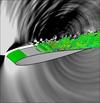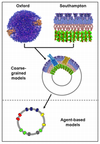HPCx
For queries about this topic, contact Ian Bush.
View the calendar of events relating to this topic.
Projects

Advanced modelling for two-phase reacting flow
Edward Richardson (Investigator)
Engine designers want computer programs to help them invent ways to use less fuel and produce less pollution. This research aims to provide an accurate and practical model for the injection and combustion of liquid fuel blends.

Aerofoil noise
Richard Sandberg (Investigator)
High-performance computing is used to identify noise sources on aerofoils.

Hunting for Walking Technicolor at the LHC
Alexander Belyaev (Investigator), Azaria Coupe
Now that the LHC experiment at CERN has observed the Higgs boson, the final piece of the particle physics theory called the Standard Model, the focus of theoretical and experimental physicists shifts to what could possibly be discovered next. Phenomenologists, such as myself, straddle this line between theory and experiment, comparing the many theories of physics Beyond the Standard Model to whatever the LHC discovers, even drawing conclusions from what it doesn’t discover. I focus on a theory called Walking Technicolor (WTC), what the LHC would see if it were correct, and what the lack of discovery so far means for the fate of WTC.

Numerical investigation of the true sources of jet noise
Anurag Agarwal (Investigator), Samuel Sinayoko
Aircraft noise severely impacts the quality of life of people living close to airports. Noise generation by aircrafts is especially large during take-off. Jet noise is the dominant noise source during take-off. It is produced by the high speed flow generated by the engine. However, the actual source of sound remains unknown. A deeper understanding of the sources of jet noise is need to be able to reduce the noise. The aim of this project is to implement a innovative method that would allow to identify the sources of jet noise.

OMSys Towards a system model of a bacterial outer membrane
Syma Khalid (Investigator)
Many bacteria have an outer membrane which is the interface between the cell and its environment. The components of this membrane are well studied at an individual level, but there is a need to model and understand the outer membrane as a whole. In this project we aim to develop such a model of a bacterial outer membrane, linking computer simulations of the component molecules through to a more "systems biology" approach to modelling the outer membrane as a whole. Such an approach to modelling an OM must be multi-scale i.e. it must embrace a number of levels ranging from atomistic level modelling of e.g. the component proteins through to higher level "agent-based" modelling of the interplay of multiple components within the outer membrane as a whole. The different levels of description will be integrated to enable predictive modelling in order to explore the roles of outer membrane changes in e.g. antibiotic resistance.

Real-time CFD for helicopter flight simulation
Kenji Takeda (Investigator), James Kenny
Project aims to show how real-time computational fluid dynamics (CFD) could be used to improve the realism of helicopter flight simulators.
Software Sustainability Institute
Simon Hettrick (Investigator)
A national facility for cultivating world-class research through software
Software helps researchers to enhance their research, and improve the speed and accuracy of their results. The Software Sustainability Institute can help you introduce software into your research or improve the software you already use.
The Institute is based at the universities of Edinburgh, Manchester, Oxford and Southampton, and draws on a team of experts with a breadth of experience in software development, project and programme management, research facilitation, publicity and community engagement.
We help people build better software, and we work with researchers, developers, funders and infrastructure providers to identify key issues and best practice in scientific software.

Towards Exascale computing in particle physics
Andreas Juttner, Jonathan Flynn (Investigators), James Harrison
Lattice QCD
People
 Jonathan Flynn
Jonathan FlynnProfessor, Physics & Astronomy (FPAS)
 Richard Sandberg
Richard SandbergProfessor, Engineering Sciences (FEE)
 Andreas Juttner
Andreas JuttnerReader, Physics & Astronomy (FPAS)
 Edward Richardson
Edward RichardsonSenior Lecturer, Engineering Sciences (FEE)
 Alexander Belyaev
Alexander BelyaevLecturer, Physics & Astronomy (FPAS)
 Gwenael Gabard
Gwenael GabardLecturer, Institute of Sound & Vibration Research (FEE)
 Anatoliy Vorobev
Anatoliy VorobevLecturer, Engineering Sciences (FEE)
 Syma Khalid
Syma KhalidPrincipal Research Fellow, Chemistry (FNES)
 Felipe Alves Portela
Felipe Alves PortelaResearch Fellow, Engineering Sciences (FEE)
 Petros Bogiatzis
Petros BogiatzisResearch Fellow, Ocean & Earth Science (FNES)
 Azaria Coupe
Azaria CoupePostgraduate Research Student, Physics & Astronomy (FPAS)
 James Harrison
James HarrisonPostgraduate Research Student, Engineering Sciences (FEE)
 Matthew Higgins
Matthew HigginsUndergraduate Research Student, Biological Sciences (FNES)
 Jess Jones
Jess JonesTechnical Staff, iSolutions
 Elena Vataga
Elena VatagaTechnical Staff, iSolutions
 Petrina Butler
Petrina ButlerAdministrative Staff, Research and Innovation Services
 Anurag Agarwal
Anurag AgarwalAlumnus, Institute of Sound & Vibration Research (FEE)
 James Kenny
James KennyAlumnus, Engineering Sciences (FEE)
 Samuel Sinayoko
Samuel SinayokoAlumnus, BMLL
 Kenji Takeda
Kenji TakedaAlumnus, Engineering Sciences (FEE)
 Mark Vousden
Mark VousdenExternal Member, University of Southampton
 Simon Hettrick
Simon HettrickNone, None